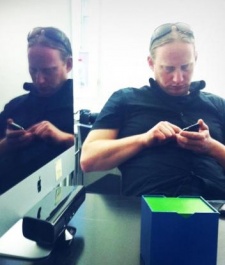The Swiss Arts Council's two-year GameCulture programme comes to an end in November 2012, by which time it will have spent somewhere in the region of £1 million.
To find out about the aims of the project, its future, and how the cash gets doled out, we caught up with head of the programme Sylvain Gardel.
He told us how the initiative hopes to benefit Swiss developers, noted an explosion in Swiss smartphone development, and explained how GameCulture was boosting the medium's cultural cache.
Pocket Gamer: What is GameCulture programme, and what are its aims?
Sylvain Gardel: The GameCulture programme is an initiative of the Swiss Arts Council, and it started in 2010. Its aim was simply to help videogames gain more cultural recognition; to change the climate of computer games and mobile games in a positive way.
We've also been working to ensure that gaming is a topic on the political agenda, and we've been working to help developers. We want to help them come up with the thing that interests us most new concepts and innovative ideas.
We are the cultural council, which means that our focus is always on people who are working on new ideas and new concepts.
The GameCulture programme has a budget of 1.5 million Swiss Francs. How is this money used?
Much of it is used exhibit videogames at cultural events. Perhaps 800,000 francs was spent on these exhibitions.
But we've also had a couple of projects where we directly funded game developers, working with partners.
The way that works is that we'll put out a public call for projects, and developers will send us concepts and prototypes over a period of 4-6 months. These are then evaluated by an international jury, which will choose the projects that seem the most interesting and innovative.
Of the 36 projects that have been submitted to us, I think we've funded seven to the tune of around 300,000 Swiss francs in total.
We do prototype funding, so the idea behind that is that we help developers to get their concepts to a certain maturity, where they then can find people who will buy their concepts, or they can release it independently.
And we support artists. The most interesting concepts will often rot somewhere, and never see the market. Instead, we want to give these people the time and money they need to develop their concepts.
How do you measure the success of the games you fund?
While it wouldn't be true to say that we don't care about commercial success, we don't award funding on that basis either. If we did, we'd choose very different concepts probably those with more mainstream approaches.
What's interesting for us is what the press has to say about the games we fund. That might be one way we judge success we're interested in artistic concepts and cultural responses.
Are there any examples you can point to that have been successful in this way?
Most are actually still in development, but almost all of them have attracted the interest of third party funding groups.
Some are in discussions with Indie Fund, for example.
How do you judge the success of GameCulture as a programme?
What we're seeing over the past six months is an explosion of people coming up with smartphone games.
There's also the recognition the programme has gained, and the attention we receive. GamesCulture has generated more than 400 print media articles in Switzerland, so we're keeping the topic in the media.
One thing that we're certainly seeing is that people recognise the value of games more. It used to be a medium that the general population didn't think about. Now, you'll see a university using games to attract students, for example.
So, you can see that there is something going on in the world of Swiss games development. You can't easily get figures out of it, but you can see the results, and we believe that cultural recognition helps the medium generally.
The GameCulture programme ends in November 2012. What happens then?
Our new initiative the Digital Culture programme should start in spring 2013. Despite the change in name, we won't be dropping the games issue.
Some of the work of the GameCulture programme will continue in the Digital Culture programme. We'll still be making calls of projects, for instance, and the funding will continue.
Thanks to Sylvain for his time.
To find out more about GameCulture, and for a look at some of the games it's involved with, visit the GameCulture website.
Sylvain Gardel on how the Swiss Arts Council is promoting the culture of game development
Public funds seeding the discussion






















